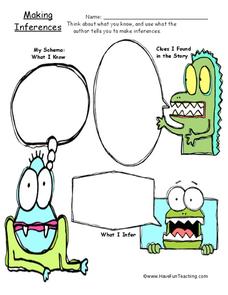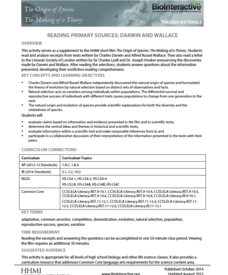Las Cumbres Observatory
Star In a Box
Stars may all look the same from down here, but their surfaces tell a different story. Using an animation, learners collect data about the temperature and luminosity of stars and compare them to their mass and radius. They then answer...
PBS
Insulation Station
It's all about the material. Learners experiment with different substances as they try to keep an ice cube from melting. They draw conclusions by answering a set of questions about the types and amount of material that had the best result.
Curated OER
Exploring Contrasts in "The Lanyard" by Billy Collins
Middle schoolers analyze the speaker's ideas and tone in the Billy Collins poem "The Lanyard." After identifying how each of the five senses is addressed in the poem, they compare images to draw conclusions about the speaker and his...
Curated OER
The Sinking of the Titanic
Investigate the sinking of the Titanic with young scholars. They will read actual documentation from the Titanic and answer questions. They will then draw conclusions from the pictures they see and information they read.
Curated OER
Gathering Statistics for Research
Learners gather statistics to include in their research. For this statistics lesson, students investigate how to incorporate statistics into research and other readings besides math. They collect data based on other topics, analyze the...
Illustrative Mathematics
Equivalent fractions approach to non-repeating decimals
Trying to get your class to think of decimals as fractions and vice versa can lead to interesting discussions. After all, we can usually understand quickly that 1/4 is .25 but why is 1/7 not so easy to convert? This activity looks...
Have Fun Teaching
Making Inferences (21)
Monstrous! But do not be afraid! These weird-looking creatures won't scare readers away from making inferences about what authors are trying to show, rather than tell their readers. Instead the toothy, bug-eyed aliens model the...
Curated OER
Earthquakes: Sixth Grade Lesson Plans and Activities
Young seismologists learn more about plate tectonics with a set of pre-lab, lab, and post-lab lessons plans on earthquakes. After exploring how waves travel through various materials, sixth graders record their observations and...
Balanced Assessment
Solar Elements
Let your brilliance shine like the sun. Future mathematicians and scientists consider given data on the abundance of different elements in the sun. The assessment task requires consideration of how these different abundances relate to...
Statistics Education Web
Consuming Cola
Caffeine affects your heart rate — or does it? Learners study experimental design while conducting their own experiment. They collect heart rate data after drinking a caffeinated beverage, create a box plot, and draw conclusions....
PHET
Mapping the Field of Multiple Dipole Magnets
So you built a magnetometer, now what? High school scientists use their magnetometer made in a previous lesson to map the union of magnetic fields of dipole magnets. They experiment with different alignments and draw conclusions about...
Chicago Botanic Garden
Climate Change Around the World
Look at climate change around the world using graphical representations and a hands-on learning simulation specified to particular cities around the world. Using an interactive website, young scientists follow the provided...
Chymist
Landfills and Recycling
Examine the nature of landfills through experimentation. Scholars build miniature landfills and monitor changes over a six-week period. Observations allow individuals to draw conclusions about the different types of trash and their...
K5 Learning
The Fox and the Little Red Hen
Read about the fox family that decides to cook a hen for dinner. After reading, individuals answer questions about the elements of plot in the story. They require drawing conclusions, making predictions, and describing specific...
CK-12 Foundation
Stow Lake
Does the depth of a pond matter to the waves created when rain is falling? Many people assume the answer is no, but interestingly, it does matter. Pupils explore this concept and other variables related to wave behavior through a...
University of Minnesota
C. elegans and Alcohol
Investigate experimental design through a hands-on exploration. A creative lesson allows learners to design an experiment to monitor the effects of alcohol on the C. elegans worm. After conducting the experiment, individuals analyze...
Howard Hughes Medical Institute
Reading Primary Sources: Darwin and Wallace
Take your classes back in time. Learners read real historical texts from both Darwin and Wallace as well as an announcement of their findings. Using guiding questions, they make inferences and draw conclusions from the information in the...
Howard Hughes Medical Institute
Look Who's Coming for Dinner: Selection by Predation
What happens when a new predator comes to town? Learners analyze an experiment that studies the effect of predation on selection. They use real data to draw conclusions about the impact a new predator has on a prey species.
Howard Hughes Medical Institute
Living Dinosaurs: Fact or Fiction?
Are birds descendants of dinosaurs? Learners consider the question as they watch an informative video comparing fossil records of dinosaurs with current species. Following the video, groups ponder the evidence to draw conclusions about...
Howard Hughes Medical Institute
Weighing the Evidence for a Mass Extinction: Part 1 – In the Ocean
Extinction events have happen throughout geologic history, but only five mass extinctions occurred over the last 4.5 billion years. Scholars view fossils from a layer of sediment during an extinction event and observe patterns to draw...
Howard Hughes Medical Institute
Battling Vector-Borne Diseases: Factors That Affect the Mosquito Life Cycle
Slow the spread of disease by slowing disease carriers in their tracks. Learners explore just how they might accomplish this as they experiment with the life cycle of a mosquito under different conditions. Scholars design and conduct...
Serendip
The Molecular Biology of Mutations and Muscular Dystrophy
Different types of mutations cause unique types and degrees of muscular dystrophy. Scholars learn about the types of mutations and the impact on the body. They compare the location of the mutations and draw conclusions about how it is...
Howard Hughes Medical Institute
Evolution in Action: Data Analysis
An environmental factor, such as a drought, sometimes speeds up the rate of natural selection. Scholars analyze data on the beaks of birds around the time of the drought. They compare those that survived to those that perished and find...
Howard Hughes Medical Institute
Got Lactase? Blood Glucose Data Analysis
Many physicals include a blood glucose test, but what are doctors actually testing? Scholars graph and interpret blood glucose data, allowing them to observe the differences in lactase persistence and draw conclusions. They then connect...
Other popular searches
- Drawing Conclusions Reading
- Data. Drawing Conclusions
- Drawing Conclusions Lessons
- Drawing Conclusions in Reading
- Data Drawing Conclusions
- Reading "Drawing Conclusions
- Drawing Conclusions Worksheets
- Drawing Conclusions Science
- Drawing Conclusions From Text
- Drawing Conclusions Activities
- Drawing Conclusions From Data






















